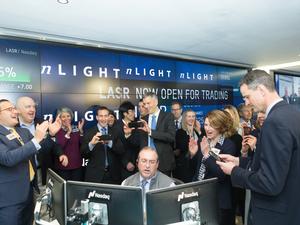
Shares of software maker Expensify (Nasdaq: EXFY) popped Wednesday when trading started and valued the Portland company at $3 billion.
The expense management company priced its initial public offering at $27, the top of its expected range, and its shares debuted on the Nasdaq exchange at $39.75. The IPO raised $263 million.
Trading started around noon Eastern Time.
“It’s been pretty wild,” said founder and CEO David Barrett. “A fun fact, you don’t start trading at 9 a.m. At 9 a.m. a bunch of bankers do a bunch of stuff and you wait around for a couple more hours.”
Want more Portland startup news? Sign-up for The Beat delivered to your inbox twice weekly
All that waiting happened with the entire team. The company brought all 140 global employees to New York for the debut and were celebrating on the 101st floor of a building near the exchange.
Through this process, Barrett also learned that the ceremonial ringing of the bell doesn’t really do much so the company brought its own bell — a large antique bell inscribed with the Expensify name. Everyone got little bells as well, so as the stock moves there is a wave of bells, he said.
Expensify’s debut is the latest in what has shaped up to be a busy year for Oregon and southwest Washington IPO activity — something that prior to 2020 was a rarity. Oregon hadn’t seen a major tech IPO since 2004 when Cascade Microtech debuted. And in the ensuing years the state’s mid- and small-sized public tech companies were bought up by out-of-state companies and the list of locally based public companies shrunk dramatically.
However, the number of companies going public has slowly ticked up. In southwest Washington nLight started things off, followed by ZoomInfo and then Absci. Here in Oregon, Arcimoto, Laird Superfood, ESS Inc. and Dutch Bros have all debuted, with the latter two just this fall.
“IPOs are critical for an ecosystem,” said Portland Seed Fund Managing Partner Angela Jackson. “They create life-changing wealth for more than a few founders, recycle talent and reward early investors for placing risky bets on early stage companies. Until this year, the paucity of Oregon IPOs was a bit of an elephant in the room. Now, with ESS Inc, Absci, Expensify, and others in the pipeline, 2021 will be a watershed year for entrepreneurial wealth creators and those that back them.”
For Barrett, this milestone still marks just the beginning of the opportunity he sees ahead for his company. Expensify makes software employees in large and small businesses use for expense reimbursement, invoices and bill pay. It also offers a payment card that ties it all together. It’s a straightforward business, which Barrett said helped on the IPO roadshow.
However, Barrett has a clear view for the long term and says Expensify is going after the trillion-dollar opportunity to be the platform that links the world through financial conversations. He notes that these conversations are everything from company payroll to invoicing and billing to the payments between friends and roommates.
“We are modeled more after a Facebook or a LinkedIn than Salesforce or Concur. Every payment is a conversation between two or more people to resolve financial tension,” he said, adding that the industry has been fragmented by applications but in his world Expensify is the universal payment engine for it all.
To maintain this long-term commitment, the company has three classes of stock. The traditional Class A Common Stock and then two classes of high voting shares, that are illiquid. Prior to the IPO, employees were offered the chance to convert their own shares to these high voting shares, Barrett said. Two-thirds of the internal shares were converted.
These high voting shares can’t be sold until notice is given and then the seller must wait 10 months or 50 months, depending on which class it is before the shares convert to common shares. These shares are a requirement for employees on a management track, but for all the others it was optional.
“It shows how long employees want to stick around,” he said.
These shares are held in a trust with three equal trustees so no one person is voting the entirety of these high voting shares.
“I’m not a dictator for life at the helm,” he said, alluding to other companies whose executives have high voting shares to maintain control of company decisions. “Everyone is accountable to the board. I can’t stack the board.”
In addition to the unique share classes and taking care of his employees, Barrett said he wants the day to be remembered as proof that you can be profitable and high growth. For the first six months of 2021 the company reported profit of $14.7 million compared with $3.5 million profit for the first six months of 2020.
“Profit and growth should go hand in hand and somehow Silicon Valley lost that message,” said Barrett who moved the company’s HQ from San Francisco to Portland. “CEOs looking to us: If you build profitability and growth into the business model from day one you can maintain both.”
In 2019 it reported revenue of $80.5 million and profit of $1.3 million, though it swung to a loss in the pandemic economy of 2020.
Shares closed on opening day at $41.06.







